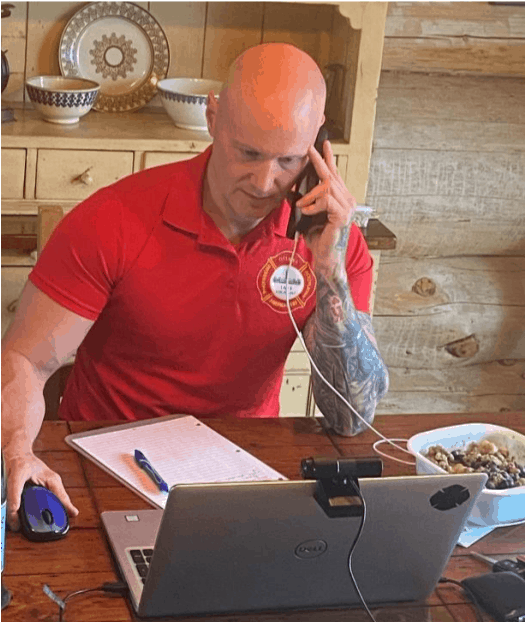by Guest Blogger Neil McMillan
I am a firefighter. Firefighters have been trained to achieve order out of chaos, to resolve hazardous and dynamic situations full of unknowns, and to utilize the resources at hand to accomplish seemingly insurmountable tasks.
None of those goals could be reached without our brother and sister firefighters, who enter the breach by our side. With pride—and without hesitation—firefighters stand at the ready to respond to dangerous situations in the service of others, in order to mitigate hazards and protect life, property, and the environment. The stakes are high,
Firefighters are generally a very healthy group. Those who pursue the occupation understand and embrace the physicality of our job and maintain a high standard of physical health. However, firefighters are disproportionately afflicted with higher rates of many cancers. We tend to be diagnosed at an earlier age, and with more aggressive forms of the disease, than the general population.
The increase in cancer diagnoses among firefighters activated members of our profession to lead the charge against this newly-emerging hazard. We sought out experts in research, chemistry, and health, and partnered with universities to help us better understand our occupational risks.
“We began to learn about which products of combustion are released from wood, plastics, and common household furnishings. We learned about how these chemicals enter our bodies–via inhalation, ingestion, and absorption–and how long they remain there. We learned about additives to products, such as PBDE flame retardants, that are not necessary, but that pose a great risk to our health when burned. We also learned about products marketed to firefighters that increase our toxic load and cancer risk, such as the PFAS chemicals found in firefighting foam and in the gear and clothing that was promised to protect us.”
With each answer came new questions. We had entrusted vendors, manufacturers and industry to guide us as to what is safe, and what standards we require. As such, we left ourselves vulnerable to risks which have been hidden from us.
We are slow, but we get there.
In the US, it is reported that 66-70% of firefighter non-Line of Duty Deaths are attributable to cancer. In Canada, where I live, that figure is 86%. Academic research shows statistically significant increased risk of cancer for firefighters, in some cases over 5 times in certain cancers within specific sub-groups. Children of firefighters have a 27 times greater likelihood of being diagnosed with cancer, compared to their peers. The soup of carcinogens, mutagens, and endocrine disrupting chemicals firefighters are exposed to from acute fires becomes compounded by poor sleep hygiene and chronic exposures to carcinogens brought back to fire stations post-fire.
The chemicals I am speaking about are varied and numerous. They include well-studied carcinogens, but also poorly-regulated compounds prevalent in our environment that have not been well-researched. Firefighters are regularly immersed in a chemical bath. The numerous chemicals firefighters absorb, ingest, and inhale produce a synergistic or ‘cocktail’ effect where 2+2 equals a lot more than 4.
Compensation for a cancer attributable to the work we do is simply that – compensation. It does not equate to the suffering or loss we and our families suffer and all too often, claims are denied, along with the recognition that a firefighter acquired the cancer, even in part, as a result of entering into hazardous chemical environments full of asbestos, carcinogens and toxins in the service of others.
I was 37 years old when I was diagnosed with cancer. I was active, and otherwise healthy with no lifestyle or genetic risk factors. However, I was just shy of the years of service required for my cancer to be recognized as being related to my work. Perhaps it was for this reason that I continue my Association’s work of increasing awareness about and prevention strategies for combating cancer among firefighters.
My story is an example of why our Provincial Association works tirelessly to manage the hundreds of cancer claims they assist with, and lobby the government to recognize the proven links between our work and the cancers so many of us are burdened with. When colleagues reach out for assistance with a cancer diagnosis, I give them notifications about new clinical cancer trials, emerging research, and proposed legislation about reducing workplace exposures to cancer causing-chemicals and practices. Processing over 20 new cancer claims from our active and retired members is not uncommon over the course of a year.
As research and science continue to draw links between the occupational exposures firefighters face in their work, workplace insurers, medical professionals, and legislators must keep pace and enact policies and regulations to guarantee that benefits and entitlements are in place to support workers who, in spite of all their personal efforts, contracted cancer because of one reason – they did their job.





